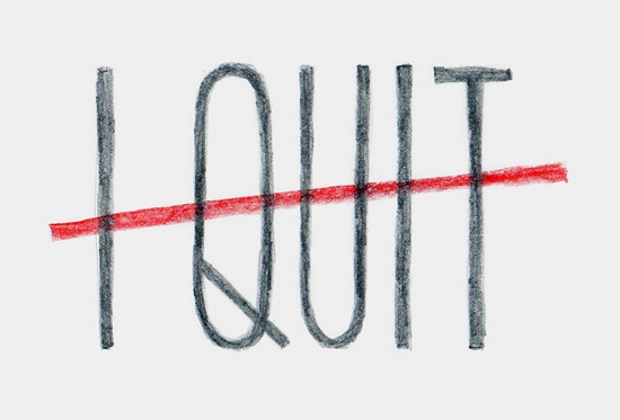Should You Quit Your Job?

Right about now, your inbox, your social feed, your local news, your parakeet are all squawking, “New Job, New You!”
Spoiler alert: this ain’t that.
Yet, every year about this time we’re all elbow-deep in those New Year’s Resolutions we should never make. Chief amongst them is usually: get a new job.
But should you?
Just before Christmas, a friend reached out to me and told me that she’d gotten a job offer. It was a good job offer, and one she actively sought. All that stood between her and the new job was telling her current boss.
She was dreading giving her notice, worrying that her boss would let her have it. She hemmed, she hawed, she hesitated. But, when she went in to give her notice, her boss surprised her with a counter offer: a big one. The counter offer was for more money, but also more responsibility, a bigger title, a seat at the table, a pathway towards the corner office.
She was shocked.
Knowing that I’ve spent more than two decades guiding people through massive moments of career shift, she reached out to me.
“The counter offer is so good, but I’m not sure what I should do. How do I figure this out?”
I proposed a solution — something that I’d never suggested to anyone.
“What if you took my Limitless Assessment three times: once for your current job, once for the imagined state of the external job you just got offered, and once for the imagined state of the promotion at your current company?”
So she did, and it helped her understand not just “what makes a good job good,” but “what makes a good job good for her.”
We’ve all been handed that list of what makes a good job good: the same old ideas handed to us by school and career counselors, including things like mission, leadership, scope, impact, prestige, and money. These “scorecards” are meant to determine the value of the job, but they leave out the most important part of the equation: the value of the job to you.

If you’ve determined that your dream job is not really all that dreamy, it may be that you have done all the right things along everyone else’s path to everyone else’s definition of success, only to realize when you’ve moved into a new age or life stage that the great life you built was meant for someone else.
You don’t have consonance — the sense of frictionless belonging, of momentous stride, of core relevance. It is a guiding force that reveals how your work contributes to your overall life’s plan. It connects your daily activities to the success of those around you, and gives you clarity about why you — specifically you, in that seat, in that office, in that box on the organizational chart — matter. Consonance is not just purpose writ large (and lofty). It’s your purpose, freely and clearly defined by you, and put into action through awareness of and alignment with your life’s plan.
Consonance is when what you do matches who you are (or who you want to be). You achieve consonance when your work has purpose and meaning for you. Throughout my career, I have seen over and over again the damage caused by a lack of consonance, by the disconnect between purpose, action, and that external view of success. And I saw that true success comes from a combination of four particular elements that allow individuals to carve their own paths, do their best work, and live their best lives. The elements of consonance are calling, connection, contribution, and control:
Calling is a gravitational pull towards a goal larger than yourself — a business you want to build, a leader who inspires you, a societal ill you wish to remedy, a cause you wish to serve.
Connection gives you sightlines into how your everyday work serves that calling by solving the problem at hand, growing the company’s bottom line, or reaching that goal.
Contribution means that you understand how this job, this brand, this paycheck contributes to the community to which you want to belong, the person you want to be, or the lifestyle you’d like to live.
Control reflects how you are able to influence your connection to that calling in order to have some say in the assignment of projects, deadlines, colleagues, and clients; to offer input into shared goals; and to do work that contributes to your career trajectory and earnings.
Consonance looks different for everyone. It’s ever-changing, evolving as we age and pass through life’s various stages and adjust our priorities. Yours will be unique to you. The four elements that make up your consonance, however, are fixed. Before you leave your less-than-dreamy job, consider assessing how these elements add up in their own unique way for you, so that you may truly find the right next job that offers value to you.

A great way to do that is with the Limitless Assessment.
Now, to be fair… I’ve only ever just told people to take it to assess where they are in their current jobs. But I thought, why not? It could be used to imagine future state, and see if those shiny new job offers were all they were cracked up to be. After all, success at work isn’t about checking all the boxes. It’s about checking the boxes that are right for you. And that means having the right amounts of calling, connection, contribution, and control for you and only you.
Here are the screenshots she texted me when she gave it a try:
This is her current job. She wants far more calling, connection, contribution, and control than she has. |
This is her imagined future state for the job offer at the new company. She’s got the contribution there, but still out of consonance with everything else. |
This is the imagined future state at her current company. She is more in consonance with her control, and dead on the money for connection and contribution. |
Once she did this, the decision became crystal clear. In her current job, she didn’t have nearly as much of anything as she wanted. Going to the new company seemed like a great idea in theory. But in the end, placing herself in the role and thinking about what it would be like day-to-day meant that she was only inching towards happiness rather than the giant leap she’d get from staying put and accepting the promotion. The promotion at her current work actually looked even better once she looked at it through the lens of data. (Yay for nerdery!)
So, should you quit your job? Beats me. But I have a tool that can help you figure it out.
Published with Permission via Laura Gassner Otting
– Laura Gassner Otting, Washington Post Bestselling Author. Limitless: How to Ignore Everyone, Carve Your Own Path, and Live Your Best Life.

